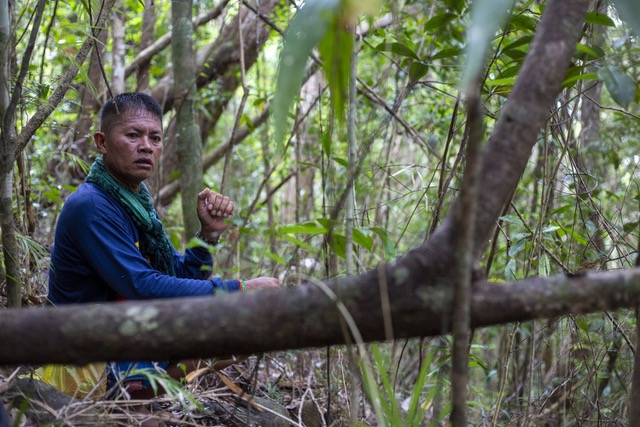“Delikado” is an eye-opening documentary that could use a little help in finding the multitude of viewers that it deserves. Its Emmy nomination, announced on July 28 thanks to the folks at the US National Academy of Television Arts and Sciences who deemed it worthy of inclusion for the 44th News and Documentary Emmy Awards under the Outstanding Investigative Documentary category, could start the ball rolling.
“I hope the Emmy nomination can rouse more interest in the film, bring new energy to the issue of illegal logging, and galvanize more support for all environmental defenders and indigenous people who risk their lives and the future of their families to protect our last frontier,” said the broadcast journalist Kara Magsanoc-Alikpala, one of its producers,
Since “Delikado” was first shown in Canada on April 29, 2022, the 94-minute film has collected awards and jury prizes; it has as well been included among official selection titles at various film festivals and special screenings held around the world. (See “’Delikado’: forest defenders in the line of fire,” CoverStory.ph, May 25, 2023.)

But the film—which follows the life-and-death struggles in Palawan of environmental defenders Bobby Chan, Nieves Rosento and Efren “Tata” Balladeres as they fight timber poaching, illegal fishing, corporate greed, and corrupt authorities—has yet to be shown in mainstream theaters in the Philippines.
“Delikado” premiered in the country on Aug. 13, 2022, as the closing film of the 18th Cinemalaya Philippine Independent Film Festival. But the only way for people to be able to watch it is by sending a request to [email protected] or messaging its Facebook page. Educational distribution company GoodDocs takes care of educational and community screening requests outside of the Philippines ([email protected]).
State of slow death
“Delikado” exposes what is happening in Palawan, a province regarded by many as the Philippines’ “last ecological frontier,” with its swathes of unbroken forest cover—the largest remaining in the country. As described by one of its defenders, the island is in a state of slow death.
“In Palawan, many people are being killed for being a land defender,” said Chan, an environment lawyer who runs the Palawan NGO Network Inc. (PNNI) which is headquartered in the capital city of Puerto Princesa. He put up “sculptures” of confiscated chainsaws as “a statement to the authorities [who condone the illegal activities], to show that we are not afraid, and are willing to stand up to them.”
“These sculptures are also a symbol to everyone on the island, that they shouldn’t be afraid either,” he added.
PNNI maintains a small group of volunteers who look for timber poachers in the forest, not to arrest them but to confiscate their chainsaws, and, in many instances, their weapons. Sometimes the group, which is operating on a shoestring budget, also goes on sea patrol to look for fishermen using illegal methods and confiscate their boats and illegal fishing implements.
To make a statement and to convince everyone in Puerto Princesa to appreciate his team’s efforts, Chan had the chainsaws—numbering over 700 since his team started confiscating them in 2000—stacked into towering structures. But in January 2021, these were all dismantled and removed from the PNNI’s premises by the Puerto Princesa local government. Chan was later declared as persona non grata by the Palawan provincial government. Because of threats to his life and that of his family, he left the province and now manages PNNI operations remotely in Manila.

“Delikado” also follows the story of Rosento who was, at the time of the documentary’s filming, running for reelection as mayor of the town of El Nido. As a passionate anti-logging advocate, she often clashed with the province’s leaders. But her greatest challenge came when then President Rodrigo Duterte vowed on national television that he would kill her, because she was supposedly included among 46 local government officials with links to the illegal drug trade. Somehow, Duterte’s “war on drugs” became a political tool to silence Rosento’s opposing voice in the province.
With her name included in the “narco list” that was made public two months before the midterm elections on May 13, 2019, campaigning became a risky endeavor for Rosento and her team. She eventually lost her bid for reelection.
No evidence was ever presented to back Rosento’s alleged involvement in the illegal drug trade, and she was never charged with the supposed crime. In 2022, she ran again in the local elections and won a seat in Palawan’s provincial board.
Gut-wrenching
In “Delikado” there are a number of heartbreaking moments, especially the scene where PNNI’s “Kap” Ruben Arzaga decides to do a recon on suspected timber poachers on a heavily forested mountain in his hometown of El Nido. Arzaga lost his life during that mission, and the funeral scene that followed was truly gut-wrenching.
Arzaga’s colleague, Balladares, a former logger and paramilitary leader who is regarded as the most experienced among PNNI’s para-enforcers, laments that their work should be the work of the government but that the latter is not doing its job. He wonders: If PNNI stops its fight versus illegal loggers and fishers, what will happen? “Trabaho ito ng gobyerno, pero wala silang ginagawa. Sino pipigil nito kung wala kami dito?”
Before Arzaga, 11 PNNI para-enforcers have been murdered since 2001.
Sydney-based cinematographer Tom Bannigan, who followed Balladares’ team in some of the raids shown in the film, described “Delikado” as “a story of hope and resilience.”
“These people are up against straightforward corruption and the odds are stacked against them, but they still persist. I hope people feel inspired by [the film], rather than overwhelmed,” Bannigan said.
For Magsanoc-Alikpala—maker of such films as the 1997 television documentary “Batas Militar” and, more recently, “11,103,” which features the stories of martial law survivors—the problem in Palawan as shown in “Delikado” is “immense and complicated.”
“It’s never easy battling greed and those with deep pockets and private armies,” she said.



Leave a Reply